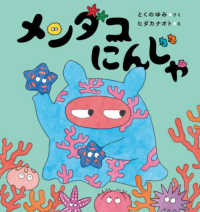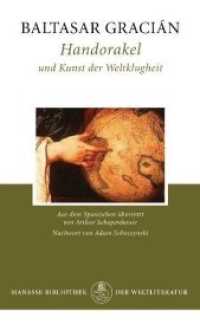- ホーム
- > 洋書
- > ドイツ書
- > Humanities, Arts & Music
- > Linguistics
Description
(Short description)
The Fascist Character as Enigma offers a new reading of Italy's 'divided memory' of fascism by way of an unconventional point of view.
(Text)
The Fascist Character as Enigma offers a new reading of Italy's 'divided memory' of fascism by way of an unconventional point of view: that of the villain. The narrative shape of antagonists, spies, traitors, and collaborationists has often been overlooked as either caricature or stereotype. However, in many cases such 'freaks' constitute the most entertaining figures of a plot, bringing to the story its twists, mysteries, and unexpected turns of events. Why are evil and vice so fascinating? Why, despite their negative roles in history and society, are characters such as the fascist or the Nazi, still powerful in triggering our imagination and most forbidden desires? Sadism, sexual perversion, and ambiguity, physical deformation-to name a few-form the common traits of villains in works that deal with the difficult, traumatic memory of fascism, tracing a genealogy of evil and darkness which will guide us from Calvino and Moravia to Bertolucci, Rossellini, and Fenoglio. Thanks to a unique comparative and multidisciplinary crosscutting approach, Riccardo Antonangeli's study provides insightful narratological readings of films, novels, short stories, memoirs, and historical reconstructions which tried to frame, portray, make sense of a blurred and unequivocable past.
(Author portrait)
Riccardo Antonangeli is post-doctoral research fellow at "Sapienza" University of Rome. He holds a PhD in Italian Studies from NYU, and he taught Italian language, literature, and cinema at CUNY, FIT and NYU. His favorite research topics are narratology, theory of the novel, philosophy of time, the intersections between history and narrative, and the reception of classical myths in medieval and modern literature. His previous books are Ezra Pound e l'ultimo Pasolini (2016) and Non esisterà più il tempo. Eternità e trama nell'arte del racconto (2020).
Emilia Di Rocco is Associate Professor of Comparative Literature at the Department of European, American and Interdisciplinary Studies at University of Rome "La Sapienza". In 2019 she was awarded the Fulbright Distinguished Chair Lectureship at Northwestern University, Department of Italian and French (spring term 2021).








